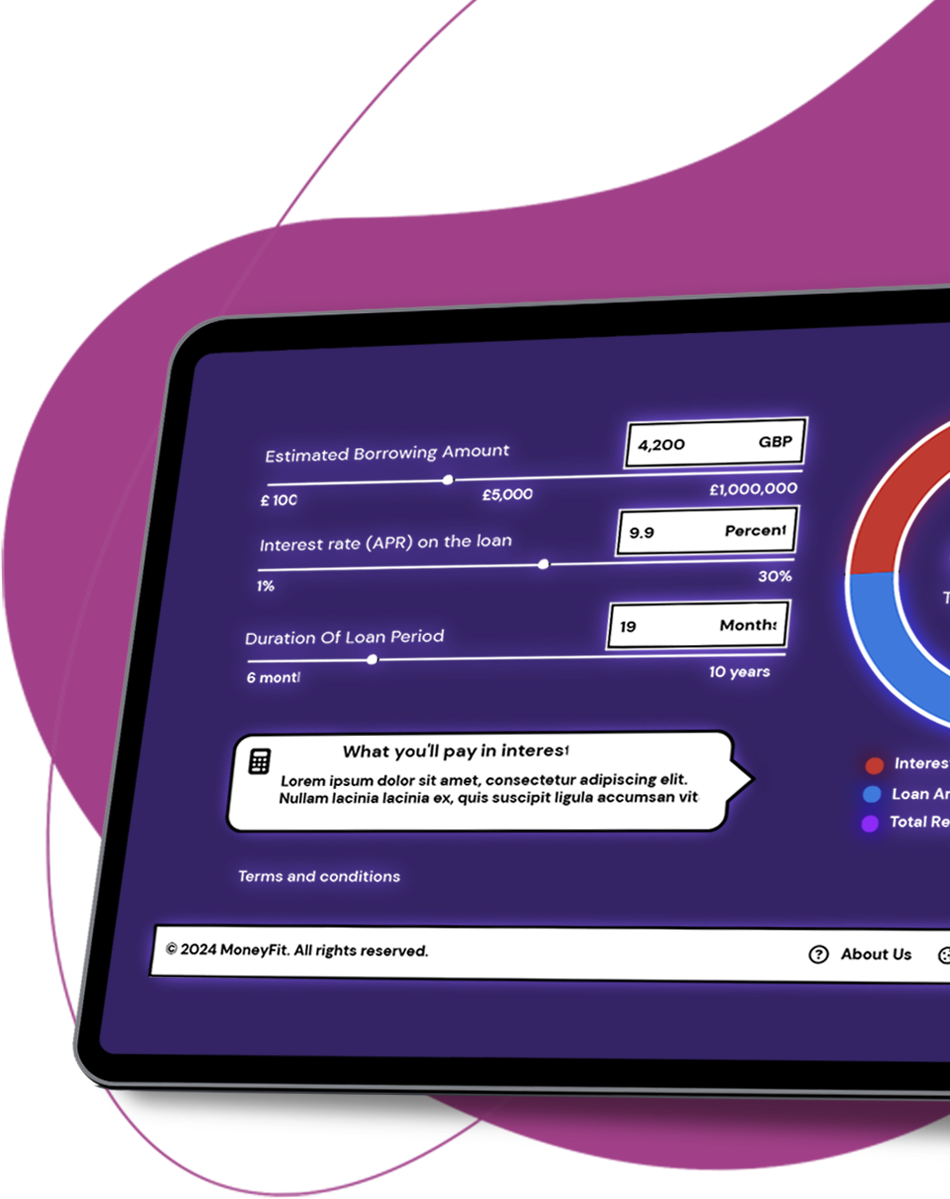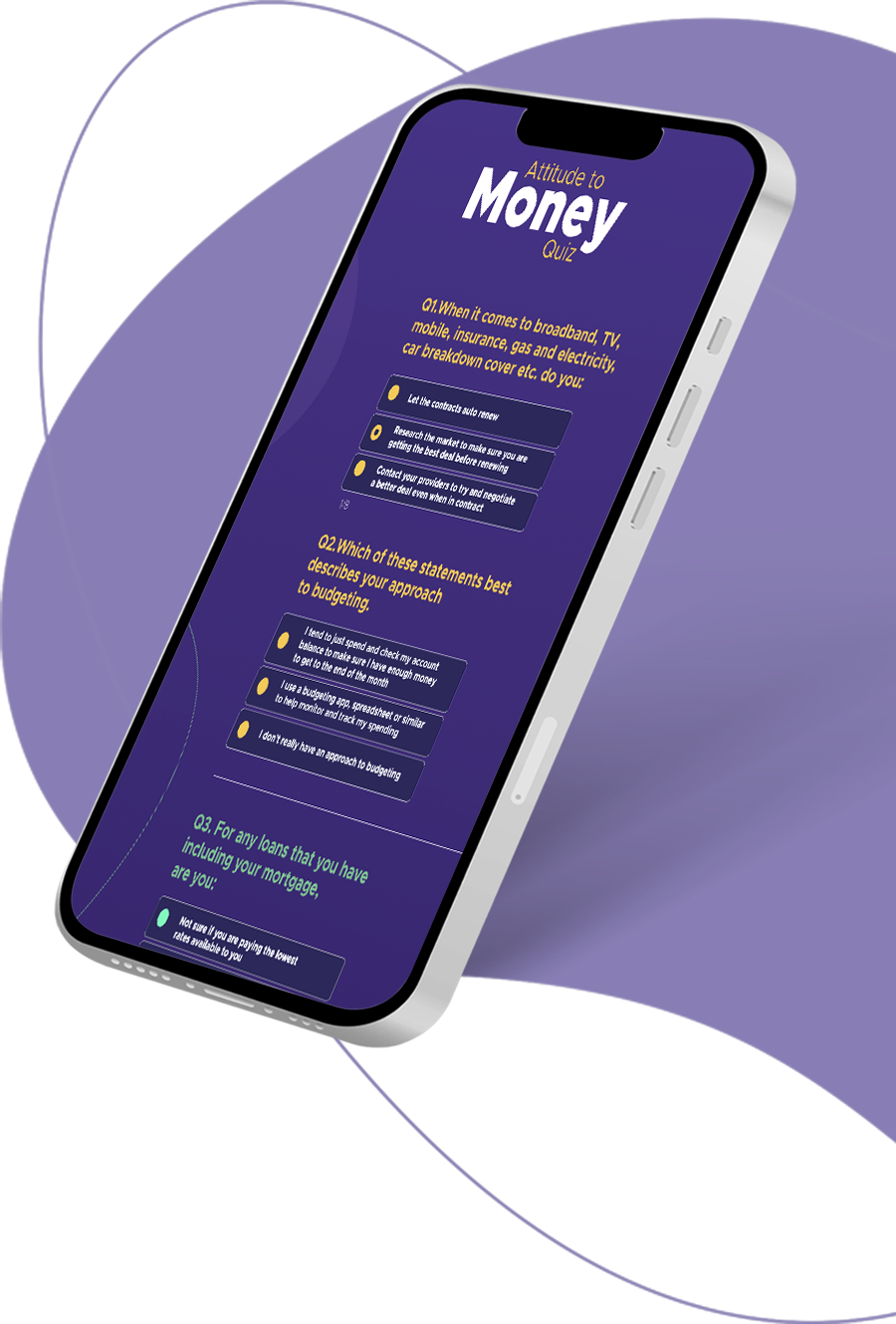Money Glossary
The world of finance is full of language that we weren’t taught at school, so it’s not surprising that many people find it confusing. Here is a helpful Glossary of Terms that demystifies the language of money.
If there’s a word or phrase that isn’t here, email hello@money-fit.co.uk and we’ll add it to the glossary.
Example: If interest is paid on savings on a quarterly basis at 5%, the cumulative impact of interest paid over the year is actually 5.07%, so the AER is 5.07%. This is because at the end of the first quarter, a £100 balance will earn £1.25 and be added to the £100 balance = £101.25 which will then accrue interest for the following quarter and so on, making the total interest AER 5.07%. AER then takes into consideration the frequency of interest calculated to provide a benchmark comparison over an annual period.
Action: Check out the Savings Interest Modeller to see how interest on savings grows over time.
Action: Have a look at the Loan Interest Modeller to see the impact of APR interest on loans such as mortgages and credit cards.
Interesting Fact: For an employee earning £20,000 a year, who is auto enrolled into the company pension scheme at the minimum contribution levels of 5% employee and 3% employer contributions, it costs the employee £45.86 to have £91.73 paid into their pension pot. This is based on the employee contribution of £57.33 (including £11.47 tax relief) and the employer contribution of £34.40 on qualifying earnings. The value of pension investments can fall as well as rise.
Action: Check out the Loan Interest Modeller to see the impact of interest payments on credit card debt.
See also Tax-Free Allowance.
Action: Take a look at the Small Savings Add Up modeller. Create your own personal budget using the free MoneyHelper budgeting tool, or search for Free Budgeting Tools.
For more information about tax payable on the interest on savings visit Gov.uk
Example: Jane saves £100 for 10 years at 5% AER. The £100 will grow to £105 after year 1. In year 2, the interest gained is 5% on £105 and so on. After 10 years, a £100 saving will grow to £164.70, which is a total of 64.7% growth due to the impact of compound interest.
Action: Check out the Savings Interest Modeller to see the impact of compound interest on savings.
Action: Visit the Loan Interest Modeller modelling tool and calculate the interest payable on a £200 credit card bill over 3 years at 29.9% APR.
See also Debtor.
Interesting Fact: Credit scores were developed during the 1950s. The initial idea came from US engineer Bill Fair and mathematician Earl Isaac, as a way to standardise how people are lent money.
See the Pensions section in Learn About Money Resources for more information.
See the Pensions section in Learn About Money Resources for more information.
There are two types of breathing space:
- A standard breathing space, available to anyone with problem debt. It gives them legal protections from creditor action for up to 60 days. The protections include pausing most enforcement action and contact from creditors, and freezing most interest and charges on their debts.
- A mental health crisis breathing space is only available to someone who is receiving mental health crisis treatment and it has some stronger protections. It lasts as long as the person’s mental health crisis treatment, plus 30 days (no matter how long the crisis treatment lasts).
For more infomation, visit breathing space guidance for creditors.
See also Loan to Value.
Example: If a property costs £300,000, a 10% deposit would be £30,000, with a remaining mortgage of £270,000 required (plus moving costs such as legal fees) to purchase the property.
Drawdown is a way of taking money out of a pension pot to live on in retirement. The first 25% of a pension pot can be drawn down without paying any tax on it, as a tax-free lump sum. Any amounts after the first 25% are taxable as earnings in the tax year that they are taken.
See also Annuity.
For more information on drawdown, visit what is flexible retirement income pension drawdown.
Example: A flat is worth £200,000, and the outstanding loan owed on the flat is £160,000. The equity in the flat is £40,000.
Example: A car insurance policy has a £400 excess. The policy holder has an accident that is their fault and the repair bill is £2,000. The insurance company will pay £1,600 of the repair bill, but the policyholder will have to pay the excess, i.e. £400 out of their own funds.
Interesting Fact: The term ‘tax man’ is outdated, in fact females make up 52.4% of the workforce of HMRC.
Interesting Fact: The concept of insurance dates back to around 1750 B.C. with the Code of Hammurabi, which Babylonians carved into a stone monument and several clay tablets. The code describes a form of insurance whereby a ship’s cargo could be pledged in exchange for a loan. Repayment of the loan was contingent on a successful voyage, and the debtor did not have to repay the loan if the ship was lost at sea.
There are 4 types of ISA:
Cash ISA - A savings account that is not invested in stocks, shares or bonds. Interest is paid on the cash saved.
Investment or Stocks and Shares ISA - A savings account where the money saved is invested in stocks and shares, and the interest gained is free from tax. NB: Because the value of stocks and shares can decrease as well as increase, an investment ISA may lose money and does not guarantee growth in value.
Junior ISA - A tax-free savings account for children up to the age of 18. The current maximum allowance for a Junior ISA is £9,000 p.a., and any interest paid on a Junior ISA is tax-free each year. A Junior ISA can be set up for a child from the day they are born and can only be accessed when they reach the age of 18.
Lifetime ISA (LISA) - A tax-free savings account for people aged 18-39 who want to save for a deposit on a property or for retirement. Up to £4,000 can be saved per year, and the government adds in a bonus of 25% each year to the savings. There are various rules and limitations for a LISA. For more information see Gov.uk.
Interesting Fact: A Junior cash ISA of £6,000 saved per year, with a fixed AER of 4%, could be worth a total of £159,559 by the time the child is 18.
Action: Visit the Loan Interest Tool to see the impact of interest on loans.
Example: Property cost:
£400,000
Deposit payable: £28,000 (i.e.7%)
Mortgage required: £372,000
LTV = 93%
See also Fixed Rate Mortgage and Variable Rate Mortgage.
Interesting Fact: The word mortgage has its roots in the Latin ‘mortus’ meaning dead, and ‘gage’ meaning pledge, so mortgage means ‘dead pledge’. Historically, when someone borrowed money, they would pledge their property as a guarantee. If they failed to repay the loan, the property would be considered ‘dead’ to them as it would be taken or repossessed by the lender, hence the term dead pledge.
See also Gross Income.
Interesting Fact:A 25 year old employee on £25,000 per year who opts out of a 5% company contribution pension scheme, could miss out on £124,783 in pension contributions from their employer over the course of their employment (assumes 4% annual pay rise and a retirement age of 65).
See Defined Benefit Pension and Defined Contribution Pension.
See also Interest-Only Mortgage.
See also CPI.
Interesting Fact: Over 14,000 companies in the UK offer a Sharesave scheme.
The Government's state pension forecast tool enables anyone to check on how much state pension they could get, when they could receive it and how to increase it if possible. Visit Check State Pension to find out more.
You can check your tax code here: check income tax current year.
For income tax bands for those living in England and Wales, see income tax rates.
For income tax bands for those living in Scotland, see scottish income tax.
See Excess.






